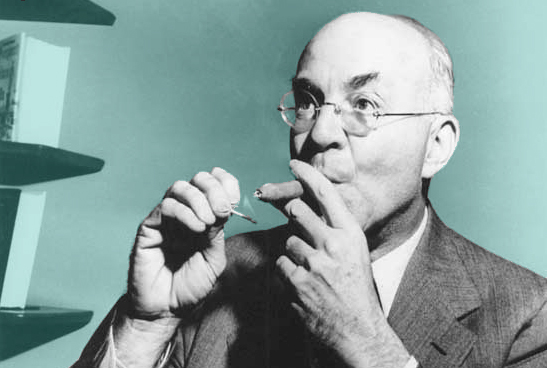
Considered, along with Hemingway, to be a writer of the “Lost Generation,”John Dos Passos was a politically radical writer greatly influenced by his travels in Europe, notably Spain, as he grew increasingly resistant to American narratives and political systems. Here he writes to Quaker ship merchant Thomas P. Cope about his travels on the sea while complaining about his fellow passengers.
[On board the Espagne
August 1920]
At sea six days West
of the Azores—Sky like
a robin’s egg fringed
with little clouds,
sea blue with a curious
pinkish mother of pearl
sheen—
Dear Old Tom, you ancient mariner—I cant help writing you though I haven’t an idea under heaven where to send this letter. I embarked on this palatial affair at St. Nazaire—It went first to Santander where I had a glimpse of a Spanish sunday, people going in carriages to the toros, sidewalks overlaid with little tables and beggars and blind musicians and bootblacks and the thick sunshine that seems to brush against your cheek like hot velvet. Then Coruña—and then twelve days sea towards Havana. The Azores were extraordinarily beautiful, buff and pale bright green with violet cliffs and vast plumed clouds piled above them. The water was a marvelous sapphire full of dolphins—What a wonderful curve they make when they leap clear of the water. There is something so sharp and breathtaking about it. How marvelous the sea must be on a boat that’s not unpleasantly overcrowded with passengers. A passenger is an obnoxious object, be he ever so human and charming in another capacity.
Please write long letters—Your letters excite me tremendously. I have been awfully blue and disoriented for a dog’s age—I have a sensation of sliding slowly and comfortably down ice on the slopes, without ever being able to grasp a handful of the real earth—Your letters are tufts of grass say—seaweed! that I can catch hold of for a moment. I suppose I’ll learn to live before I die—but there are times when I doubt it. I have an instinct—God knows where it comes from—to shrink from contacts. A sort of congenital cowardice—like that of the snail and its horns. Don’t you think that snails may pass their lives wishing they knew what happened in the world after they had drawn back into their shells?
From Havana I go to New York to try to get a novel published—all these flowers blushing unseen are beginning to get on my nerves…
Damn these floating palaces.
I’m tired of hearing that the Cuban lady at my table (who has a little dog like those Venetian courtesans have in Veronese and is that shape [refers to a sketch] and comes from Algiers and speaks Spanish with an Andalusian accent) sleeps alternately with the two fat gentlemen from Barcelona with whom I play shuffleboard for bottles of champagne, or that the French lady who dances so well applies a fresh pair of horns each day to her husband’s forehead…
Somebody is playing the Humoresque on the palatial piano in the palatial salon—In the steerage—which stinks I must admit to heaven—they play the gaetá. By sheer boredom and banality civilizations fall. The Humoresque has all the concentrated banality of those staid Roman gentlemen and ladies of decadent times who stand in proper rows along the Appian way. Never mind—Warsaw has fallen—at least I suppose it has.
The other day we had some splendid waterspouts. Then, too, there have been gigantic porpoises and many playing fish.
Write all sorts of things. I’m crazy to hear your adventures.
Love
Dos
FURTHER READING
To read a paper on Dos Passos in Spain, click here.
For more on Dos Passos, Hemingway, and their Spanish connection, click here.
f


